 h) perpendicular to
the rotation axis. The banana bonds illustrate the strong
reconstruction, by pairing of four of the six nearest-neighbours of
the two vacant atoms (white); The Si-Si bond length is 2.76 Å.
h) perpendicular to
the rotation axis. The banana bonds illustrate the strong
reconstruction, by pairing of four of the six nearest-neighbours of
the two vacant atoms (white); The Si-Si bond length is 2.76 Å.
Lattice di-vacancy in Si
``Reconstruction-by-pairs'' model (C2h)
Two symmetry operations of the C2h point group are also depicted: a two-fold
rotation axis (C2) and a mirror
plane ( h) perpendicular to
the rotation axis. The banana bonds illustrate the strong
reconstruction, by pairing of four of the six nearest-neighbours of
the two vacant atoms (white); The Si-Si bond length is 2.76 Å.
h) perpendicular to
the rotation axis. The banana bonds illustrate the strong
reconstruction, by pairing of four of the six nearest-neighbours of
the two vacant atoms (white); The Si-Si bond length is 2.76 Å.
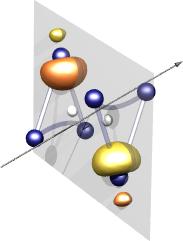
|
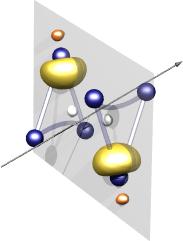
|
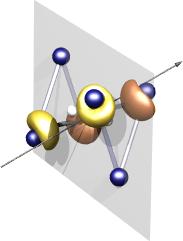
|
| Strong Pairing | ||
| 341st * bu symmetry * |
Highest occupied spin-up KS level (342nd) * ag symmetry * |
343rd *au symmetry * |
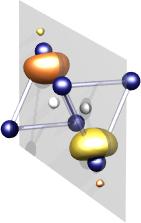
|
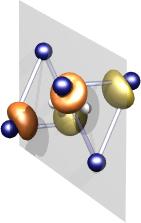
|
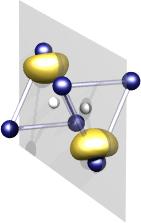
|
| Weak Pairing | 341st * bu symmetry * |
Highest occupied spin-up KS level (342nd) * au symmetry * |
343rd *ag symmetry * |
The initial configuration was set up following Oshiyama's model - The `resonant-bond' model. According to this model, the sense of the Jahn-Teller distortion is the opposite of that of the 'rebonding-by-pairs' model of Watkins. Instead of an inward movement, by pairing of four of Si neighbours of the vacant sites (white), these atoms move outwards, while the other 2 atoms move inwards. As a result, the six atoms constituting the di-vacancy become almost 5-fold coordinated.
As a result of optimisation, the structure evolved to a weak-paring version of the above by Watkins. The Si-Si length is 3.46 Å to compare with the value of 2.76 Å for case of strong(er) pairing. Furthermore, this structure was found to be 0.35 eV higher in energy than that shown above.